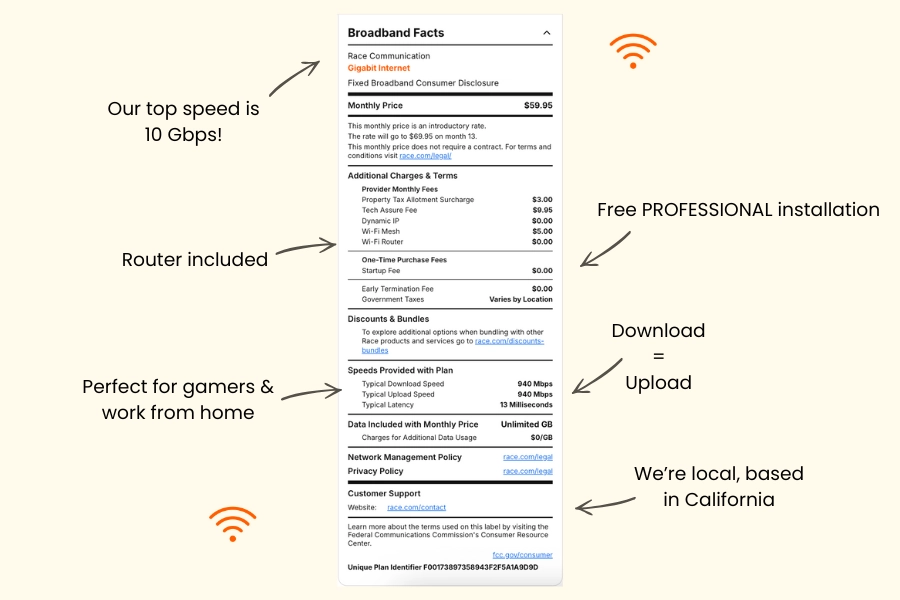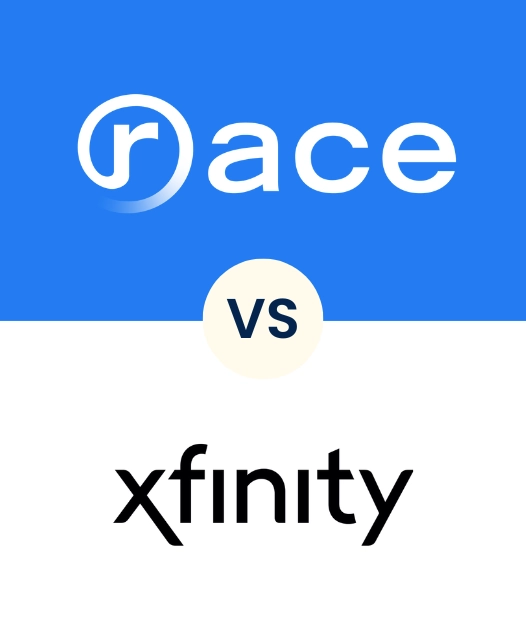Key takeaways:
- Race Communications vs Xfinity both offer high-speed internet in parts of California, but they differ significantly in network technology, upload performance, and long-term flexibility.
- Race Communications delivers fiber-to-the-home (FTTH) with symmetrical upload and download speeds, making it better suited for remote work, video conferencing, and data-heavy households.
- Xfinity relies on a hybrid fiber-coaxial network, which can offer fast download speeds but much slower uploads on comparable plans.
- Xfinity provides standardized pricing with multi-year price locks, which may appeal to customers who prioritize predictable monthly bills.
- Both providers offer unlimited data and no contracts, but Race Communications doesn’t throttle speeds based on usage.
- Xfinity emphasizes national scale and price consistency, while Race Communications focuses on fiber performance, symmetrical speeds, and local customer support where available.
Race Communications vs Xfinity: which one should you choose?
In California communities where both are available, Race Communications is usually the better choice in 2026 for households that value fiber infrastructure, symmetrical speeds, and local customer support.
Xfinity remains a viable alternative for customers who prioritize long-term price locks and standardized nationwide plans, but it relies on hybrid cable technology with significantly slower upload speeds.
This guide is designed for California residents comparing Race Communications and Xfinity in areas where both providers operate. While Race Communications is not available statewide, there is meaningful overlap in several Northern and Central California communities.
Because availability, pricing, and fees can vary by city, this article focuses on overall differences between the two providers, not city-specific plans. For hyper-local comparisons, separate city-based guides are recommended.
Disclaimer: Pricing, speeds, and plan availability are based on publicly available information as of January 8, 2026, and may vary by location.
Race Communications vs Xfinity: Overview
- Race Communications excels with its modern fiber-optic technology, providing top-tier internet speeds and reliability.
- Xfinity offers a mix of hybrid fiber-coaxial connections with broad coverage and bundled services, appealing to many users.
| Feature |

|

|
|---|---|---|
| Max speeds | Up to 10 Gbps | Up to 2 Gbps |
| Network type | Fiber-to-the-Home (FTTH) | Hybrid fiber-coaxial (HFC) |
| Upload speeds | Symmetrical | Asymmetrical |
| Free router* | ✔️ | ✔️ |
| Local customer support | ✔️ | ✖️ |
| Outsourced call centers | ✖️ | ✔️ |
| Free installation* | ✔️ |
$39.99 self-install $100 professional install |
| No data caps* | ✔️ |
✔️ Throttling after 30GB |
*Notes:
- Race Communications charges $10/mo. for router in rare communities.
- Xfinity may reduce speeds after 30GB of premium data usage on some plans, which can impact performance for high-usage households.
- Race Communications generally includes free professional installation, while Xfinity charges additional installation fees depending on setup type.
How much does Race Communications cost vs Xfinity?
Xfinity pricing (with 5-year price lock)
Xfinity offers standardized pricing with long-term price guarantees:
- 300 Mbps — $40/month
- 500 Mbps — $45/month
- 1 Gbps — $50/month
- 1.2–2 Gbps — $70/month
The main advantage here is predictability: Xfinity advertises price locks of up to five years, which can appeal to customers who want billing stability.
Race Communications pricing
Race Communications’ pricing depends on location and promotional availability:
- 300 Mbps (Internet 300) — ≈ $34.95
- 500 Mbps (Internet 500) — ≈ $44.95
- 1 Gbps (Gigabit Internet) — ≈ $39.95—$59.95
- 5 Gbps (5 Gigabit Internet) — ≈ $89.95
- 10 Gbps — ≈ $119.95
Most markets include a Tech Assure fee of $9.95/month.
Xfinity vs. Race Communications: Customer Support
Xfinity operates at national scale, which can be efficient when everything works. But some customers describe a very different experience when they need help with moves, billing, or recurring outages.
One Reddit user described their experience dealing with repeated outages and customer support while working from home:
I am beyond tired of having to burn PTO for a service I pay for. I am literally losing money because my internet does not work. Instead of helping me or my neighbors, Xfinity is telling us to expect higher prices. This is unacceptable.
Another long-time Xfinity customer described difficulty getting a recurring connection issue properly addressed:
Called Xfinity customer service and after going round and round with automated system finally spoke to Xfinity Rep / … / BUT she opened a DAMAGE compliant ticket, not a trouble ticket / … / Called Xfinity 800 number again only to be disconnected while waiting on technical support. This is beyond a lack of service but an outright breach of agreement.
At Race Communications, we take pride in offering exceptional customer support that puts our customers first. We can resolve many issues remotely, saving you time and hassle.
For issues that require an in-person visit, we aim to provide next-day service, because we know how important it is to stay connected:
Switch to Race about 4 months ago. It has been amazing. Xfinity would constantly go out, several times a day, we constantly were calling Xfinity to have it fixed with no resolution. Race came in and we have only had 1 interruption from a squirrel chewing through the new line. They came the next day and replaced the whole line and even moving it so it would not happen again.
Race Communications vs Xfinity: Which is faster?
- Race Communications offers 10 Gigabit Internet, which is the fastest residential internet speed currently available in the nation.
- Xfinity’s plans have varied speeds with lower upload speeds than download speeds (asymmetrical internet speed).
Download speeds
At commonly purchased tiers (300 Mbps–1 Gbps), both providers deliver strong download performance suitable for streaming, gaming, and general household use.
Where Race Communications differentiates itself is at the multi-gigabit level. Xfinity currently tops out around 2 Gbps, while Race Communications offers plans up to 10 Gbps in select markets.
Upload speeds
- Race Communications (1 Gbps plan): ~940 Mbps upload
- Xfinity (1 Gbps plan): ~41 Mbps upload
Upload speeds matter more than many people realize in 2026, especially for:
- Remote and hybrid work
- Video conferencing
- Cloud backups
- Smart home systems
- Content creation and file sharing
Race Communications’ symmetrical fiber speeds provide far more headroom for modern internet use.

Is fiber internet better than cable in 2026?
Race Communications: Fiber-to-the-Home (FTTH)
Race Communications uses true fiber-to-the-home, meaning a dedicated fiber strand runs directly to each residence. This means:
- More consistent speeds during peak hours
- Lower signal degradation
- Easier upgrades as bandwidth demands grow
Xfinity: Hybrid Fiber-Coax (HFC)
Xfinity’s network combines fiber with shared coaxial cable lines. While capable of fast downloads, HFC networks:
- Share bandwidth among neighbors
- Have technical limitations on upload speeds
- Are more sensitive to congestion during peak usage
In practical terms: fiber networks like Race Communications are generally considered more future-proof, especially as upload demand continues to rise.

Race Communications vs Xfinity: Final takeaway
There is no single “best” internet provider for everyone. But in California communities where Race Communications and Xfinity overlap, fiber technology, symmetrical speeds, and local support give Race Communications a meaningful edge in 2026.
Choose Race Communications if you:
- Want fiber-to-the-home internet
- Need fast upload speeds
- Work from home or run a home business
- Prefer local customer support
- Want access to multi-gigabit speeds beyond 2 Gbps
Choose Xfinity if you:
- Want long-term price locks
- Know how to set up your internet connection by yourself (or don’t mind paying Xfinity’s $100 professional installation fee)
- Don’t need fast upload speeds
- Don’t rely on customer support
👉 If you’re interested in Race Communications fiber internet services, check your address or call us at 877.722.3833. We’re happy to help!
FAQs
Choose Race Communications if you have access to it and want fiber internet with faster upload speeds, strong performance for remote work, and potentially better long-term reliability. Choose Xfinity if you need wide availability, bundling options, or standardized pricing, especially in areas where fiber providers are not available.
Race Communications and Xfinity are both present in the following California communities: Atherton, Atwater, Chico, Chowchilla, Colusa, Marysville, Nevada City, Olivehurst, Sutter, Tulare, and Yuba City. Availability, plans, and pricing may still vary by address within each community.
In most cases, yes. Fiber internet typically offers more consistent speeds, faster uploads, and better performance during peak hours than cable internet. Providers like Race Communications use fiber-to-the-home networks, while Xfinity primarily uses hybrid fiber-coaxial technology, which can limit upload speeds.
Race Communications has no data caps. Xfinity internet plans now also include unlimited data, but speeds may be deprioritized after about 30 GB of usage.
